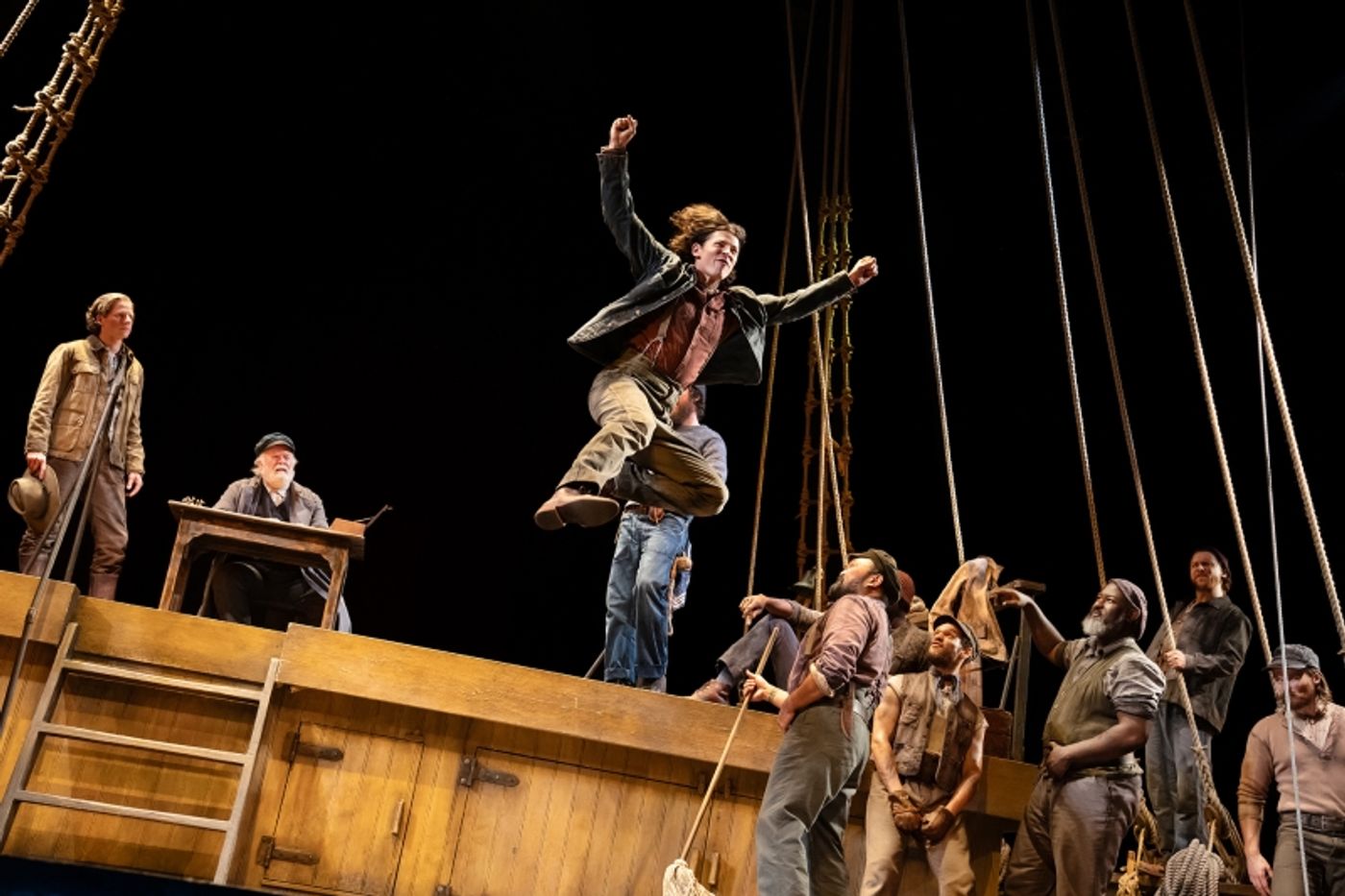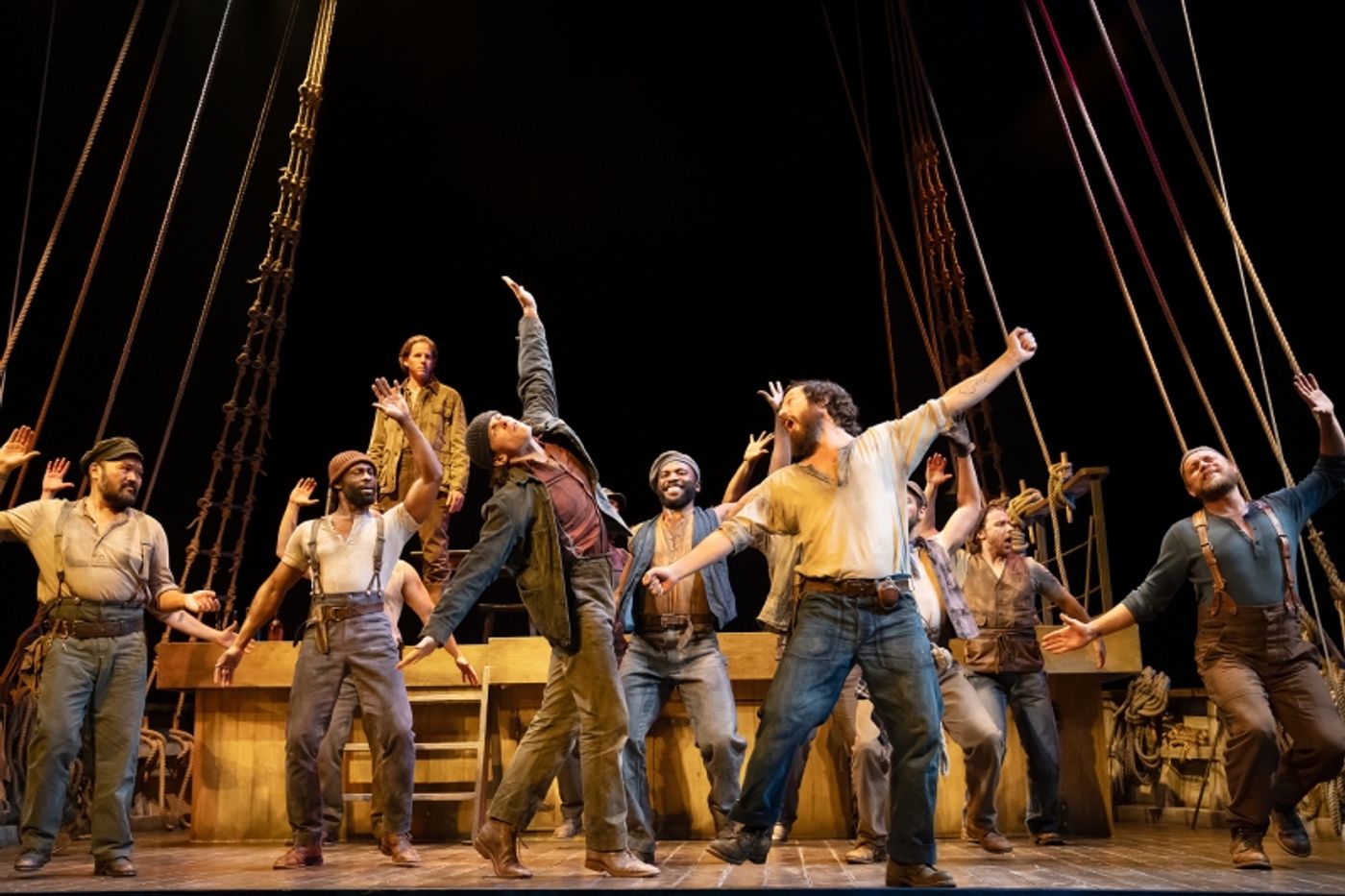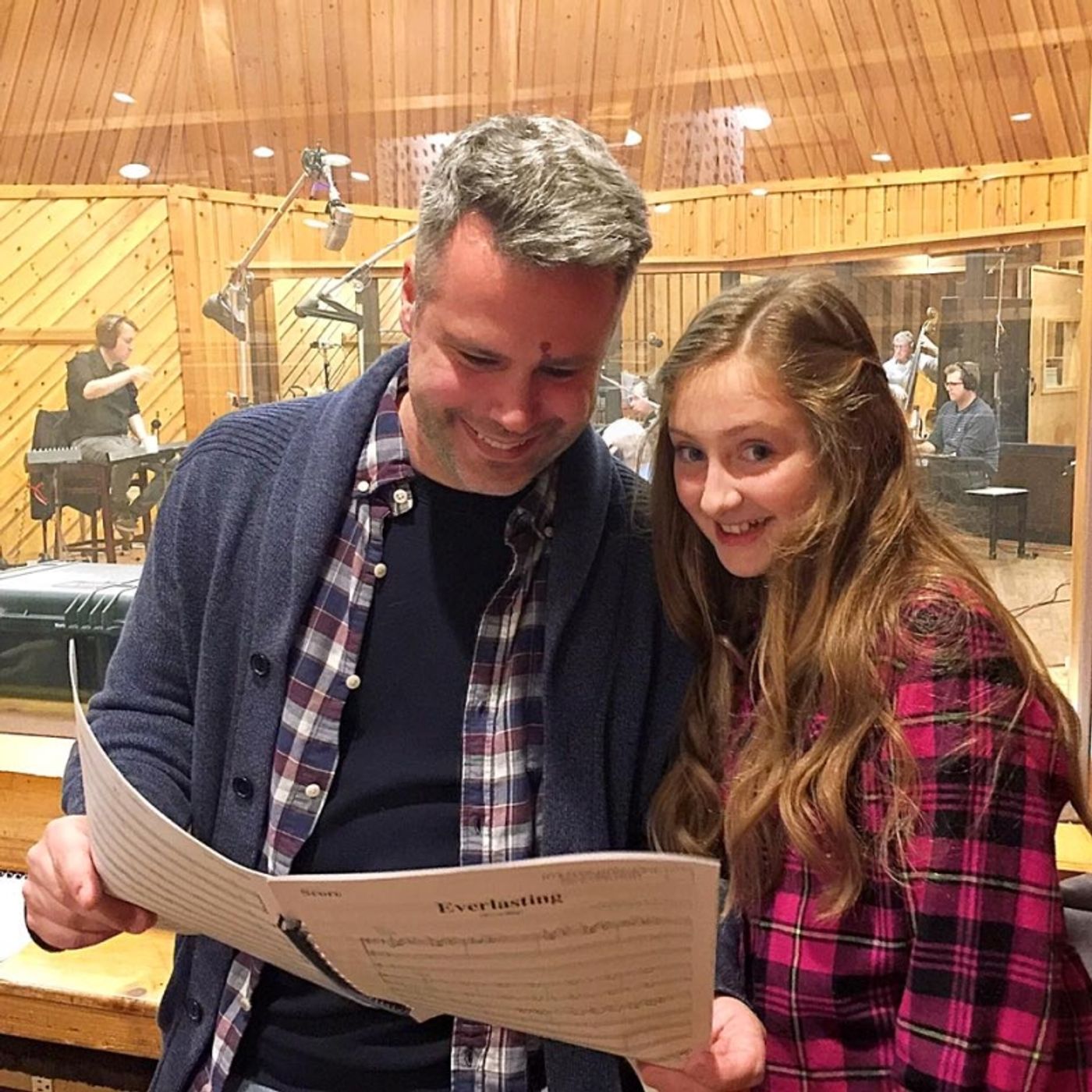Interview: Chris Miller and Brian Usifer On Orchestrating The Avett Brothers For The Stage
The co-Arrangers/Orchestrators talk about their work for Swept Away at Arena Stage and more.
Chris Miller and Brian Usifer are currently living their theatre lives as the co- Music Arrangers/Orchestrators of The Avett Brothers’ new musical Swept Away. Brian also serves as the Musical Supervisor for the show which runs through January 14th in the Kreeger Theater space at Arena Stage.
Chris Miller is the composer of The Burnt Part Boys, Fugitive Songs, Dreamland, and a very underappreciated Broadway musical called Tuck Everlasting. He has also contributed songs to PBS’s The Electric Company, Sesame Street, and Elmo’s World, and scripts for two Barnum & Bailey Circuses.
Brian Usifer is currently the Associate Musical Supervisor for The Book of Mormon and the Arranger and Orchestrator for A Beautiful Noise. Other Broadway credits include Kinky Boots (Music Director, Additional Arrangements, Associate Music Supervisor – Tour, London, and Toronto), and Frozen where he was the Musical Director and also provided additional arrangements. You might have also seen him as a pianist (type casting) on The Marvelous Mrs. Maisel.
Swept Away presents a bit of a challenge for its music department because Chris and Brian needed to transcribe the songs from the Avett Brothers’ recording first before being able to make them sound theatrical. Read on to see how the process was handled?
Having seen Swept Away I can personally attest to the fact that Miller and Usifer have succeeded in turning the Avett Brothers’ songs into theatrical pieces. The seven-member orchestra (If there are strings it’s an orchestra) under the direction of Will Van Dyke really makes their charts audibly pleasing to listen to. That’s very hard to do with pop music being turned theatrical.

Chris Miller photo by Sean Hudock.
Brian Usifer photo by Mari Uchida.
I cannot say if Swept Away will continue elsewhere after its Arena Stage engagement. You just never know. My advice to you is to grab tickets and admire the Chris Miller and Brian Usifer’s work on this show. The Avett Brothers should be very happy with the end product.
At what age did you get interested in music?
Brian- As far as I can remember, I’ve always been interested in music. We had a piano in our house and the story goes that I would just gravitate towards it and start picking out melodies of music I’d hear on TV or on the radio. So, my parents got me into a music program when I was about 4, and I stayed with that piano teacher all the way through the end of high school. I actually went on to study with her teacher in undergrad.
Chris- I think I always had music in my DNA. My earliest memories are of a little record player I had, obsessively listening to whatever I could. I grew up in a musical household- my father was a minister of music/guitar player/tenor and my mother a pianist and soprano. My brother is also a great musician.
Did you go to school for music? If yes, where did you receive your training?
Chris- I studied piano & voice at Elon University for my undergrad and then got an MFA in Musical Theater writing at NYU.
Brian- When it was time to decide what to do after high school, I was set on moving to New York City to play in bands and be a professional musician. Although I had studied classical piano, I always played in jazz bands, rock bands, you name it. I loved all music and had every intention on playing pop music for a living. I ended up going to SUNY Fredonia because I wanted to study with my teacher’s teacher, Robert Jordan. He was an incredible teacher and mentor and really shaped who I am as a musician. While I was there, I still played in jazz bands, rock bands, etc. and learned how to produce and record music.
After moving to New York City and spending some time playing in bands I started accompanying singers at NYU and became an adjunct staff accompanist and music director. They had a Collaborative Piano Master’s degree program that focused on art songs, arias, and languages that accompanists need for classical vocal coaching. I got in and did that program and had another incredible teacher who has been hugely influential on me.
What was your first professional theatre job?
Brian- There are really two answers to this! The summer before I started undergrad, a musician I played with a lot recommended me to MD a production of Grease at a theatre in Connecticut. I had no idea what that even meant but I took the job and managed my way through it. I didn’t know anything about theatre at that point and certainly had no idea it was a career or an industry. I thought it was fun but moved on with my life and didn’t much think about theatre until much later.
When I was at NYU I met a Music Director named Darren Cohen and I assisted him on a production of Parade. I was blown away by the show and loved playing that score every day. He asked me to assist him later that year on a production of Follies at Barrington Stage Company starring Donna McKechnie, Marni Nixon, Kim Crosby, and other people that I came to realize were legends. I would consider that my real first professional theatre job and it’s what made me focus my energy on a career in theatre.
Chris- I think it was playing Friedrich in The Sound of Music at the Burn Brae Dinner Theater in Burtonsville, MD. And then as a graduate student, I was a music assistant for the Encores! series at City Center in NYC.
Brian - Back in Broadway’s golden age you never saw the credit Musical Supervisor. It was always Musical Director/Vocal Arranger or something to that effect. Can you please tell us what changed over the years in terms of billing and what is the job of a Musical Supervisor?
This is a great question, and if you ask three Music Supervisors, you’d probably get 5 different answers! I’ll tell you my perception of the history and then what it typically means today.
If you consider the way that theater worked during Broadway’s Golden Age, the job of the Music Director is almost exactly what it is today. They teach the music to the singers, rehearse with the director and choreographer, help routine the score, and shape the musicality of the performances.
Then they rehearse the orchestra and put it all together in the theatre and conduct the show eight times a week. Back then, orchestra pits were open and there wasn’t amplification until the 1960’s so what the Music Director heard was a fairly accurate representation of what the audience heard.
And back then, everyone was use to acoustics in a theatre or concert hall and it was a manageable job to balance everything. Add a great orchestrator to that and the audience could hear every word and hear every note. Add a great composer to that and you had enough ears in the house for the team to get the show sounding great. The lush orchestral sound of Robert Russell Bennet and the big band influence of Don Walker were much more acoustically friendly when compared to today’s rock and pop influenced scores with drums and guitars.
Fast forward to amplified sound in the theaters, covered pits, shows developing over many years using readings and workshops, multiple tours and international productions if the show is a hit, compressed rehearsal processes where you have a small amount of time to achieve large results, and suddenly the idea of a person who oversees all of it becomes a lot more practical.
Not only in the sense of developing a show with the creative team and managing its growth after opening, but practically speaking, once the MD is in the pit, they can’t hear anything that’s happening in the theater. Having a Music Supervisor, at that point, allows someone to continue shaping the sound of the show in collaboration with the MD, orchestrator and sound designer.
And if you are lucky enough to have the show launch a tour or international productions, the Music Supervisor oversees all of those from casting through, and beyond, opening. It’s necessary to note that the job most likely first appeared as a necessity of the MD of the Broadway production “supervising” the launch of national tours as well as in the 80’s when British mega-musicals came to New York and were mounted and supervised by the MD from the West End.
It’s also necessary to note that with the abundance of catalog musicals, like Swept Away, where the show is built on existing music, someone has to function as the de facto “composer.” That could be the arranger/orchestrator, but it could also be the Music Supervisor, and is a lot of the times, all three. I’m typically brought on as the Music Supervisor very early in the process and will spend years developing the show, working with the writers and director.
When it comes time to do a reading or workshop, many directors prefer to have someone at the piano (the MD) and someone who can float between rooms, have creative discussions, go off and re-write an arrangement, etc. Then when you do a production, like I said above, the Music Supervisor can be in the house dealing with the overall musical experience while the MD is at the piano driving the ship. That is a wonderful collaboration and one that I’ve enjoyed both as an MD and as a Music Supervisor.

of Swept Away.
Photo by Julieta Cervantes.
Chris - You are known primarily as a composer. For Swept Away, you are co-orchestrating the show. How is it being on that side of things musically as opposed to being the show’s composer?
I’ve enjoyed pulling apart these songs and putting them back together. I like living in the sonic universe of the Avett’s music and approaching the orchestration of the show like a composer. My job as arranger and orchestrator on this was take the songs and create a satisfying theatrical version of them, while respecting and maintaining the Avett’s sound.
This kind of show is not simply taking a transcription of a song and putting instruments on it, you have to create a score with themes and motives and gestures, all things inherent in the music, which is why their songs are so rich, but not entirely discernible on a straight-ahead rock album. So, it’s been a fun creative journey. I love being on this side of things, it makes my composer brain learn new things and puts my hands in new places I wouldn’t normally go working on my own stuff. It’s been pretty satisfying.
Brian - Can you talk about the overall orchestral style of the score for Swept Away? When Chris and I were initially arranging Swept Away, we stayed very true to the Avett Brother’s versions of the songs. As we developed the show we began talking about how we can make Big Brother’s music sound different from the Mate, from the Captain and of course from Little Brother. Pair that with the epic and, at times, thrillingly intimate storytelling, we knew we had to make the music feel like a “score” and not just a collection of songs.
I'll talk about the arranging first because we built the foundation for what would eventually be the orchestrations on the arrangements. If an arrangement is a structure or a house, the orchestration is the interior design, the furniture, the art that you hang on the walls. One cannot exist without the other.
So, we knew that we needed the basic Avett Brothers DNA in the band - acoustic guitar, banjo, cello, and bass. They also play with a fiddle player, drummer and a keyboard player so we knew we wanted to be able to use those colors as well. When we use the acoustic guitar and banjo it is instantly the Avett sound, and then when we need to expand into a more cinematic and emotional place we have the violin, cello and piano. The percussion can take us from big folk/rock grooves to more bluegrass train beats, to sweeping orchestral swells and hits.
With this band, we are able to use the Avett Brothers folk/rock sound combined with a more theatrical and cinematic orchestral palate and go from a raucous song like “Hard Worker” to a more orchestral and soaring song like May It Last. The other thing we considered with the orchestrations was, how do we make the first half of the show sound different from the second half?
When they are on the big ship all of the music is driven by acoustic guitars, banjos, fiddling, etc. and then when they are in the life boat we hear a haunting clean electric guitar for the first time, and the piano is more present as the main color. Satan Pulls the strings uses sounds like distorted electric guitar, synth bass and rock drums that we don’t hear anywhere else in the show.
Then when we are back in the tubercular ward, the finale is led again by acoustic guitars but now we combine all of it and hear orchestral string playing and more prominent piano. All of this is in service of the storytelling and how we can use the orchestrations to support that as well as get as many colors and textures as we can out of 7 instruments.

of Swept Away.
Photo by Julieta Cervantes.
Chris - Can you please talk about how the process of orchestrating the Avett Brothers music for Swept Away went? Were you orchestrating from lead sheets? How did you and Brian decide who would score what?
We transcribed everything from the albums and did piano arrangements in order to have a jumping off point--
Brian and I would split up the workload, I would do a pass and then he would do a pass, then we’d talk about it, and combine our ideas, more often than not we’d be in the same room talking about the dramatic goals.

Photo courtesy of the artist.
Brian - You were part of the music department for the Cyndi Lauper musical Kinky Boots. Can you please talk about the experience of putting that show together, including what it was like working with a musical icon like Cyndi Lauper?
Working on Kinky Boots was truly an incredible experience for me. The summer after I worked on the first workshop of Book of Mormon with Stephen Oremus, he asked me if I would work on the first reading of Kinky Boots with him later that year. Before we did the reading Stephen had me, Jerry Mitchell, Cyndi Lauper and Harvey Fierstein over to his apartment where we all sat around his piano and started to shape the opening number, The Most Beautiful Thing in the World. I still have the GarageBand session of us all picking a vocal part and singing it to try out the arrangement.
Cyndi was so welcoming of me that day and we all ate sushi and had a lot of laughs. Needless to say, from that moment through winning the Tony for Best Musical was an incredible journey and Cyndi was always raising the bar and striving for excellence. She had a vision for that music and had us relentlessly pursue that throughout the entire life of the show. People left that theatre with huge smiles on their faces and that made it a really fun place to work.
Fun fact, Will Van Dyke, who is the MD of Swept Away, was my associate on Kinky Boots and we spent many great years together at the Hirschfeld.

Broadway musical Tuck Everlasting.
Photo courtesy of the artist.
Chris - You are the composer of what is in my opinion a very underappreciated musical called Tuck Everlasting. If someone said to you “We want to give the show another chance on Broadway.” Are there any adjustments (not that the show needs any) that you would make to put the show at the “Top of the World” again?
Thanks for the Tuck appreciation! Tuck is very special to me!
There are quite a few things I’d love to take another look at in a new version; some that I can talk about publicly are: we cut the last verse of "My Most Beautiful Day" which articulated the entire point of the song, and I think we’d find a way to restore it, and I’d rewrite some of the dance music. 😊

Photo courtesy of the artist.
What does 2024 hold in store for you?
Brian- Now that Swept Away is open, I go into back-to-back readings of new projects in December, then I am opening The Heart of Rock and Roll on Broadway in the spring and Galileo at Berkeley Rep right after. Then some more readings and workshops of newer projects and beyond that, we’ll see!
Chris- I’m developing 2 new shows with my primary collaborator, lyricist Nathan Tysen, developing two solo projects, and making an album of a cycle of art songs setting the poetry of Willa Cather I wrote for soprano & chamber orchestra among other things I can’t talk about yet 😊.
Special thanks to Arena Stage's Lead Associate, Marketing & Media Strategy Anastasia St. Hilaire for her assistance in coordinating this interview.
Theatre Life logo designed by Kevin Laughon.
Videos


.gif)